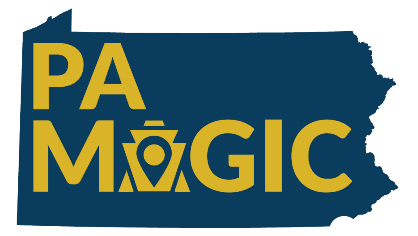- Home
- Pennsylvania House Bill 2101 Position Statement
PA House Bill 2101 (HB 2101) of 2019-2020 amends the Engineer, Land Surveyor and Geologist Registration Law (Act 367 of 1945). PAMAGIC previously responded to PA House Bill 1106 of 2017-2018 (PAMAGIC Position Statement on HB 1106). Again, we agree that much of the language in the proposed bill simply clarifies or updates present language and practice, but there are still a few aspects of this new language that are imprecise or flawed such that the effects of the amendment will adversely impact our ability to practice as GIS professionals and be contrary to the public good. There are aspects of the bill that implicitly target technologies and practices in the realm of Geographic Information Systems (GIS) without acknowledging the specialized skills and expertise of GIS practitioners.
PAMAGIC understands this is a very complex and ever evolving topic. To that end, PAMAGIC collected feedback from its membership on this position paper using a questionnaire in March of 2020. That results of that questionnaire showed a large majority of the respondents agree with the points outlined below and provided very insightful comments from current practitioners. PAMAGIC is the voice of its members and gauging the sentiment of PA's geospatial professionals is vital for continuing a constructive dialogue on this topic by those that will be most affected by this proposed legislation.
What we agree with:
- There is an explosion in the types and volumes of geodata are being collected by all manner of individuals, companies, organizations and governments.
- There is a need to understand the quality and provenance of data that is published.
- Engineers and Surveyors have unique knowledge and important roles in protecting the public welfare and many activities are better managed and controlled by surveying and engineering professionals.
- The distinctions among various practices and types of geodata collected with a myriad of devices and techniques are valid.
- Periodic updates to the registration law to address technological and societal changes are logical.
- The attempted inclusion of the NCEES Inclusions and Exclusions of Surveying Practice Model Law.
The MAJOR areas where we feel the current language is either flawed or over-reaching are:
- Partial adoption of the Model Rules and Model Law is a good start, but it is just a start. The partial adoption opens new loopholes that can be the basis of excessive legal battles and increase the price of government funded projects.
- Confusing use of the term Authoritative, creating an overly broad definition and is not crafted in reference to the topic at hand: creation, collection, analysis and distribution of geodata.
- Lack of acknowledgement of other credentials that are specific to the geospatial and technology industries, such as GISP and ASPRS certifications without requiring that Surveyors and Engineers gain any particular expertise related to GIS.
- No mention of the role of Professional Geologists who are part of this licensing legislation and whose livelihood relies on the creation of accurate and reliable maps for many industries crucial to the economic prosperity of all of Pennsylvania.
- Creates confusion in the RFP process for large and small government organizations as when to include or not include a requirement for a surveyor or engineer, particularly in the spaces of UAV data collection, MS4 asset identification and monitoring and hydrologic and topographic data creation.
Implications:
- Common activities that would be restricted to licensed surveyors or engineers given the current language in this bill include:
- Collection of any data using new technology such as computer vision and image segmentation from non-traditional sources such as autonomous vehicles, robotic data collectors and mobile device ‘data exhaust’
- Use of Government-provided Global Navigation Satellite Systems (GNSS, aka GPS) systems to all citizens and restricts the use to a subset of users even though the purchase of high grade GNSS equipment is available to anyone who can afford them
- Some of these activities might indeed be better managed and controlled by surveying and engineering professionals. If so, then government and utility costs will surely increase; this is contrary to the opinion expressed in the Fiscal Note accompanying HB HB2101.
Our Recommendations:
- The Legislature should not pass HB 2101 as it is written today.
- The Legislature should hold or sponsor hearings on HB 2101 that reflect the current national debate to provide clarification and/or improved standards that:
-
- Define the roles and responsibilities of Engineers, Surveyors and Professional Geologists AND the role that professional certification has in the creation of these products, such as GISP and ASPRS certifications
- Set standards for data collection relative to the intended data use
- Allow for technology advancements that will improve safety and increase economic growth.
- Clarify the term Authoritative, as it relates specifically to geospatial data generation, management and distribution
Approved unanimously by the Board July 10, 2020
